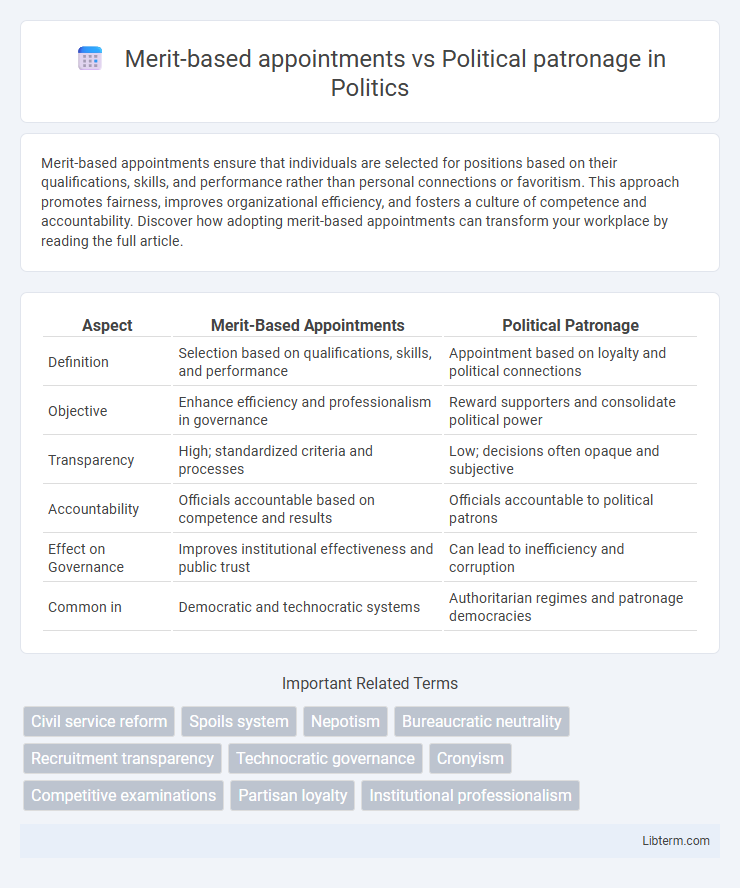Merit-based appointments ensure that individuals are selected for positions based on their qualifications, skills, and performance rather than personal connections or favoritism. This approach promotes fairness, improves organizational efficiency, and fosters a culture of competence and accountability. Discover how adopting merit-based appointments can transform your workplace by reading the full article.
Table of Comparison
| Aspect | Merit-Based Appointments | Political Patronage |
|---|---|---|
| Definition | Selection based on qualifications, skills, and performance | Appointment based on loyalty and political connections |
| Objective | Enhance efficiency and professionalism in governance | Reward supporters and consolidate political power |
| Transparency | High; standardized criteria and processes | Low; decisions often opaque and subjective |
| Accountability | Officials accountable based on competence and results | Officials accountable to political patrons |
| Effect on Governance | Improves institutional effectiveness and public trust | Can lead to inefficiency and corruption |
| Common in | Democratic and technocratic systems | Authoritarian regimes and patronage democracies |
Understanding Merit-Based Appointments
Merit-based appointments prioritize qualifications, skills, and performance, ensuring that individuals are selected based on competence and suitability for public service roles. This system promotes efficiency, professionalism, and fairness, reducing the influence of favoritism and political bias. Implementing merit-based appointments enhances government accountability and improves the quality of administrative decisions by selecting the most capable candidates.
Defining Political Patronage in Governance
Political patronage in governance refers to the practice of appointing individuals to public office based on loyalty, support, or affiliation with a political party rather than on merit or qualifications. This system often results in favoritism, undermining the principles of meritocracy and potentially leading to inefficiency and corruption within governmental institutions. Unlike merit-based appointments, political patronage prioritizes political advantage over competence and public service effectiveness.
Historical Evolution of Appointment Systems
Merit-based appointments emerged during the 19th century as a response to widespread political patronage that dominated government hiring practices, promoting efficiency and professionalism through competitive examinations. In contrast, political patronage, historically rooted in the spoils system popularized in the United States during the early 1800s, involved rewarding loyal supporters with public office positions regardless of qualifications. Over time, reforms such as the Pendleton Civil Service Reform Act of 1883 significantly curtailed patronage by institutionalizing meritocratic principles in federal employment systems.
The Selection Process: Merit vs. Patronage
Merit-based appointments rely on objective criteria such as qualifications, skills, and experience, ensuring candidates are evaluated through standardized examinations and performance assessments. Political patronage selections prioritize loyalty and connections to political leaders, often overlooking professional competencies and favoring supporters or allies. This contrast in the selection process fundamentally affects the efficiency, accountability, and public trust in government institutions.
Impact on Public Sector Performance
Merit-based appointments enhance public sector performance by ensuring qualified candidates fill roles, leading to increased efficiency, professionalism, and accountability. Political patronage often results in the placement of less competent individuals, undermining institutional integrity and causing inefficiencies in service delivery. Empirical studies consistently show that meritocratic systems correlate with higher employee motivation and improved governance outcomes.
Corruption Risks and Ethical Concerns
Merit-based appointments reduce corruption risks by ensuring candidates are selected through transparent, skill-based evaluations rather than favoritism, fostering ethical governance and accountability. Political patronage increases corruption risks through nepotism and cronyism, undermining public trust and leading to inefficiency and compromised public service quality. Ethical concerns arise as patronage fosters conflicts of interest and erodes meritocracy, while merit-based systems promote fairness and integrity in public administration.
Case Studies: Global Practices Compared
Merit-based appointments prioritize competence, qualifications, and performance, as seen in Singapore's Civil Service where transparent exams and evaluations drive hiring. Political patronage involves appointing individuals based on loyalty or connections, exemplified by some U.S. local governments where officials reward supporters with public positions. Comparative case studies reveal that merit systems enhance efficiency and public trust, while patronage often leads to nepotism and corruption.
Implications for Public Trust and Accountability
Merit-based appointments promote public trust and accountability by ensuring that qualified candidates are selected through transparent, objective criteria, which reduces favoritism and enhances government efficiency. Political patronage undermines public confidence as it often prioritizes loyalty over competence, leading to corruption, inefficiency, and weakened institutional integrity. The contrast between these appointment methods significantly impacts the legitimacy of public institutions and the perceived fairness of government processes.
Reforms and Policy Recommendations
Merit-based appointments prioritize qualifications and performance, enhancing government efficiency and accountability, while political patronage often leads to nepotism and inefficiency. Reforms should include transparent recruitment processes, standardized evaluation criteria, and independent oversight bodies to ensure fairness and competence in public sector hiring. Policy recommendations emphasize institutionalizing meritocracy through legal frameworks, promoting merit-based promotions, and reducing political interference to strengthen governance outcomes.
Future Outlook: Balancing Merit and Influence
Merit-based appointments enhance government efficiency by prioritizing expertise and qualifications, fostering a professional and accountable public service. Political patronage can risk eroding institutional integrity but remains influential in maintaining political loyalty and stability. Future outlooks suggest a hybrid model balancing meritocratic principles with strategic political considerations to achieve effective governance and democratic responsiveness.
Merit-based appointments Infographic

 libterm.com
libterm.com